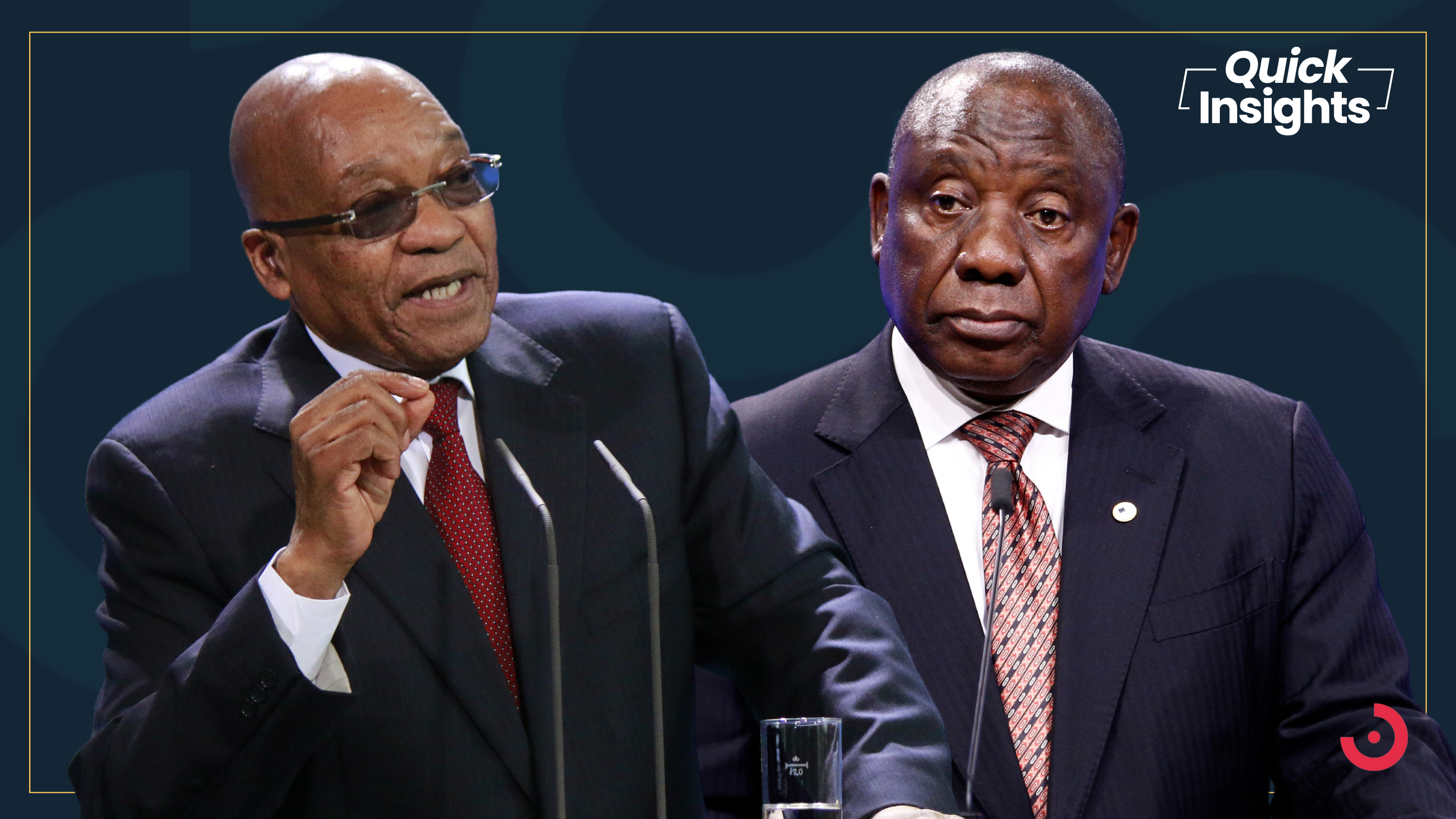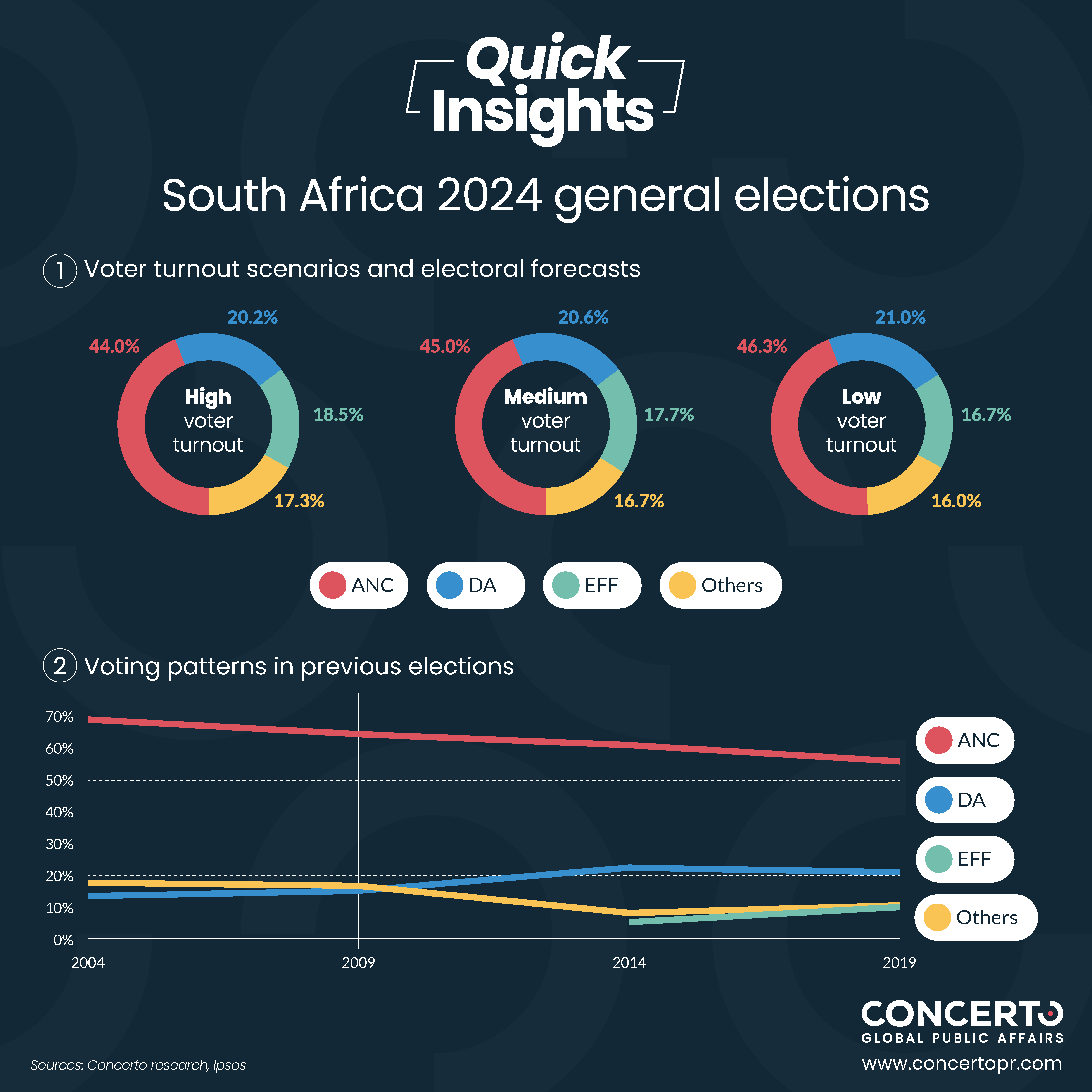Back
Jacob Zuma and the ANC: a costly divorce?
28 February 2024

Analysis
A point of no return in the rift between Jacob Zuma and the ANC was reached on January 29 with the decision to suspend the predecessor of current President Cyril Ramaphosa from party membership. A first with potentially disastrous repercussions for the ANC in its bid to remain at the head of the country. Will Zuma, who still enjoys great popularity, be able to get back into the political game? How will the ANC fare without some of the pro-Zuma votes?
À propos
Kevin Nana is a consultant at Concerto, specialising in African issues. He is particularly interested in economic (infrastructure, transport and energy) and political issues in the region. Contact Kevin at his email address, kn@concerto-pr.com, for more information on the subject, or to find out more about how Concerto can help you.QUICK INSIGHTS
- The leadership of the African National Congress has taken the historic decision to suspend Jacob Zuma, former South African president and former chairman of the ANC, from party membership. This follows his announcement that he will not support the ANC in the forthcoming general election.
- A few months ahead of the election scheduled for the second quarter, this decision, which seals an unprecedented split within the party, could make an electoral setback even more inevitable.
- The formation of the first coalition government in democratic South Africa's history could be one of the consequences of this split between the ANC and its former president.
Jacob Zuma vs. ANC: epilogue to a divorce begun in 2018?
Meeting for a three-day congress, the ANC leadership decided to suspend Jacob Zuma on 29th January 2023 following what is considered to be dissent on his part. The former party president set up a new political group called uMkhonto Wesizwe (MK), named after the ANC’s armed wing during the Apartheid era. This decision, unavoidable given the continuing escalation of tensions between the two parties, is nothing less than the latest episode in the clash between Zuma and the fringe of the party now led by Cyril Ramaphosa, his former vice-president. The tensions between Jacob Zuma and Cyril Ramaphosa date back to 2018 and Zuma's forced departure — it could also be traced back to 2017 when Ramaphosa defeated former AU chairperson Dlamini-Zuma in the ANC presidency race — , which he has never forgiven his political party for. Although one of Zuma's underlying objectives is to score enough points to force the ANC into an alliance of circumstance, enabling him to bargain for immunity from his multiple court cases, his main objective lies elsewhere. Zuma's main aim is to take revenge on the current president and weaken him politically within the party.2024: a possible electoral turning point for South Africa and the ANC
The stakes are high for the ANC, which has experienced various electoral setbacks — since 2014, the party has seen a decline in its general and local electoral scores — in recent years. The results of a poll published by IPSOS in early February shows that the ANC, which has ruled South Africa since 1994, could lose its parliamentary majority for the first time in its history under different scenarios. Scheduled for 29 May, the general elections could be a turning point for another reason altogether. They could pave the way for the formation of a nationwide coalition government, which would be unprecedented in the political history of the rainbow nation. In this eventuality, the ANC could get away without having to ally itself with its direct competitors, the Democratic Alliance (DA) or the Economic Freedom Fighters (EFF). Instead, the party could turn to an alliance with parties that don’t pose a direct threat to them and which are at loggerheads with parties directly in competition (DA, EFF). Such an alliance could involve the Inkatha Freedom Party (IFP) or other smaller parties such as the UDM, Al Jamah-ah, African Transformation Movement or the GOOD party. For the ANC, which has seen its local and parliamentary scores fall since 2009, the outcome of these elections could trigger a process of internal reflection on the direction the party should take. Although Cyril Ramaphosa still enjoys the support of a significant fringe of the party, his leadership, which has been heavily questioned, could be increasingly challenged. A score well below 50% in these elections could accelerate the race to succeed him, which has already begun at the party congress in December 2022. This may take some time, however, until a serious contender emerges.Jacob Zuma: from fallen king to kingmaker?
Speculation about Jacob Zuma's role in the outcome of the forthcoming elections is rife. A native of KwaZulu Natal — one of the ANC's strongholds — where he retains a very high level of popularity, his aim is to squeeze enough votes out of the ANC to influence future coalition negotiations. His new political formation should enable him to assert his political weight and influence possible leadership changes at the head of the ANC. The man described as the king of corruption could have a role to play in choosing the future leader of the ANC in the event of an electoral debacle. However, the reality on the ground should soon catch up with Zuma. His party's lack of local roots — outside KwaZulu Natal — is a key factor to be taken into account. Although some polls predict between 5 and 9% of the vote nationwide, his score could well be lower. A coalition between Ramaphosa's ANC and the MK party is not an option, however, unless the ruling party suffers a setback. It would mark a step backwards in the ANC's desire to distance itself from its past.